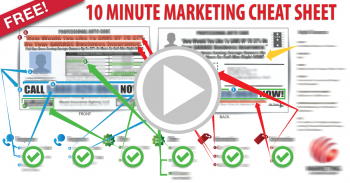Category Archives for Mindset
These Factors are Impacting Small Business Owners Today
 It’s a wild world. We talked about VUCA—the sweeping forces keeping entrepreneurs on their toes. But do you want to know the real-world factors that impact these forces? Let me tell you.
It’s a wild world. We talked about VUCA—the sweeping forces keeping entrepreneurs on their toes. But do you want to know the real-world factors that impact these forces? Let me tell you.
Running a business is not what it used to be. Some things remain—good planning, structure, pricing, and marketing. You do not need a lot of money to get into business—but don’t be undercapitalized. These days, it isn’t enough to want to “disrupt” your industry—it’s been done already. Now is the time to get smart about market forces because volatility has become the norm.
The market belongs to the nimble—three views to keep in mind
Do you have a great product or service? Let’s assume that your marketing is working for you, and then you hit a bump, or you lose an important client—you’re sunk. How do you pivot and what are the factors that can help you keep moving?
I work with entrepreneurs with brick and mortar and virtual storefronts. My goal is to help my clients make money—and keep making more. Profit flows to those who make smart choices, and take necessary, informed chances. That is what I do—help small business owners understand their choices—and chances.
Change is constant, and here are some important features all entrepreneurs should be aware of:
- You are important: Sure, everyone is important. I mean your brand—your personal brand, not only your business. For small business owners—your personal brand is often what gets you a job, or loses it. Wherever your financing is coming from, investors want to know who they are dealing with, whether you can be trusted—do you have a history of smart decisions and responsible behavior? Especially with start-ups, or new ventures, a great deal of big business still requires you to pass the smell test before someone buys from you—or sinks money into your efforts.
- Changes in the system: Stuff happens—all the time. The big picture changes depending on what channel you watch. Consider the influence of just a few overarching systems including:
- Weather: The weather is a huge system that has a big impact on business. According to the National Center for Atmosphere Research, the wily ways of weather patterns can influence the U.S. economy to the tune of $485 billion per year. Production, supply, manufacturing, energy, transport—are just a few criteria impacted by weather. Climate change affects where people live, what they buy, and where they go to spend their dollars, and their careers. Like the economy, the weather is not expected to settle down anytime soon. Keep it in mind.
- Trends: With social media, content marketing, and marketing automation, you can reach out and touch a good portion of not just your client base—but the Create the next viral video and enjoy your fifteen minutes of fame, or a few million dollars brought to you by your ability, and the ability of your team, to tap into a shifting, restless world eager for the next new thing.
- Tech: Tech is no longer just an industry. It is what you need to build into your business through innovative marketing, better processes, supply chain decisions, communication, and more. You may have a great idea, or a well-established business, but if you cannot move with the times on technology—you are going to get left behind.
- Know where you are on the curve: Are you just out of college and vying to build a no-cost start-up into something big? Have you been on a career track for ten years and ready for a change? Maybe you are part of the third-age, the Boomers or close to them, with decades of valuable experience and a desire to put it together in a different way.
Whether you are a micro-entrepreneur, or a successful CEO planning to step out, it is important to know the right steps to get where—and what—you want. Do you want to struggle for the next ten years for sweat equity? Or make some real money to support your current or hoped-for lifestyle? Work with a mentor, or business counselor to find your place on the curve, develop the right questions and be sure you have the right answers to get your best chance at success.
A big part of a profitable business today is learning how to successfully fit into a world of change. Your biggest assets are what you bring to the table in the form of knowledge, experience, adaptability, and willingness to seek and receive good advice.
When you want to ride the wave, instead of being swept up in it—call me at 585-633-7563. I can help you make the money you want.
Yours in profit,
Bob Britton
Signal or Noise? How Do Your Help Your Customers Choose You?
 You have a terrific product or service—and a lot of competition for the business. How do you help your target customer choose you?
You have a terrific product or service—and a lot of competition for the business. How do you help your target customer choose you?
My business is helping you identify, attract, and land the customers you want, to make the profit you need. As a small business owner, I know what works, and how to use marketing technology to steer business your direction, and keep it coming.
But when it gets down to it, how do you help your client hear your message, and understand your brand, through all the noise? It is not as hard as you think.
The dynamics of choice and marketing
A lot is written about the psychology of choice. Drill into the topic and you’ll find research looking at why people make the choices they do.
Understanding why people make choices is important. As small business owners, we want to know how to influence choice to get more business. Poor marketing and product lines mean your premium clients go elsewhere.
As a consumer, you know what it takes to convince you to buy. Taking that perspective is important when thinking about how to sell to your client base. Consider these points about the experience of choice:
- Choice: It is important to do what you do best. If you sell one product, or one type of service, you need to be the absolute best and understand that you are working in a niche market. In a TED talk, author Malcolm Gladwell talks about choice—and spaghetti sauce. The take-home point is that there is no one kind of human, so offering few products, or services, could be a limiting factor to your business.
- Too much choice: Plentiful research bolsters the belief that too much choice is not a good thing. Offering a dizzying array of information, products, or services is just that—dizzying. Chances are good you will land a customer if you have a lot of choice—just make sure the choice is presented in a way it can be consumed. Design your website with filters, make auto-suggestions, enable reviews, and offer pages with a limited number of products, to create a pathway to purchase in digestible bits.
- Bias and other fine qualities: Your client approaches your business with pre-conceived ideas. How you present yourself, or your product, plays to their needs, fear, and identity. Humans place inordinate weight on the first information they receive about a person, place, or thing. If a good friend liked your restaurant, your new customer is predisposed to like it, too. If a client reads a negative review of the service you sell—you need to work harder to overcome that bias. If a customer is in need of basic information, your knowledge of your product—without an initial sales attempt—gives you a chance to create the image of a knowledgeable, trusted ally instead of a pushy salesperson.
Sales work is mostly psychology, with products mixed in. Know your customer, and know what you are really trying to sell.
To get to the sell, start at the beginning
Most people can sell something once. To profit and grow your business, you have to meet the needs of your customer repeatedly. Marketing hype has its place, but the bottom line is that you have to understand your business from the viewpoint of your customer.
There is a well-known story about the angel investor who kick-started Apple. Everyone starts somewhere and Apple founders, Steve Wozniak and Steve Jobs, originally worked out of a garage. Their first investor was Mike Markkula. As the story goes, Mr. Markkula also wrote a three-part marketing platform that continues to serve this very successful company.
The three mandates written by Mr. Markkula in 1977 remain effective and include:
- The quality of empathy: “We will truly understand their needs better than any other company.”
- The ability to focus: “In order to do a good job of those things that we decide to do, we must eliminate all of the unimportant opportunities.”
- Recognition of people to impute: “People DO judge a book by its cover. We may have the best product, the highest quality, the most useful software etc.; if we present them in a slipshod manner, they will be perceived as slipshod; if we present them in a creative, professional manner, we will impute the desired qualities.”
Take what we know about the science of choice, combine it with rock-solid marketing philosophy, and a great product, and you are on your way to small business success.
By understanding your own business, you can help your customer make a choice that benefits both of you. When you need help understanding the bottom-line of your business, call me at 585-633-7563, I can help.
Yours in profit,
Bob Britton
Starting Up or Starting Over—A Few Things to Think About
Thinking about starting or relaunching your business? Both require serious consideration and a long-term plan.
Every year small business owners start, relaunch, and sell businesses. There are a million reasons why. I work with entrepreneurs to start and grow their businesses with the aim of turning a profit. A big profit. When you make more money, you can offer the service you want—at the price that sustains your lifestyle choices and family.
Starting up—five things to know
When considering starting your own business, there is a lot of work to be done. There are resources that can help you with the basics, and you need to give careful thought to questions like:
- Why do you want to start this business? Is it a mid-life moment, job—or even relationship—frustration, or is the time right for you to grab that idea and put your shingle out there?
- What is your value proposition? Go no further. I work every day with clients who have been in business for years, treading water without a lot of profit, who have no value proposition. What is a value proposition? It is how you intend to stand out from the crowd—what makes you so different that clients and businesses want to work with you. Types of value propositions include:
- Quality: You offer a product or service so much better that your business is the obvious choice
- Custom: Your services or product are special, or one-of-a-kind that cannot be obtained anywhere else
- Convenience and service: You make it so easy for people to get what they want that they have no reason to go elsewhere?
- You are us: You market your product or service so well, that your clients feel you know them, and that you would move mountains to make sure they are served
These are just a few types of value that make you different from the also-rans. Your value proposition can make or break your business—make sure you know the reason people would want to spend their money on what you have to offer.
- Who are your customers? Are you selling to a small, rarified niche of clients, or are you aiming for mass market? What are the benefits and downsides of both? What research have you done to prove you have a marketable product or service?
- Who—and where—is my competition? Are you in this alone? Do you have a stand-out product no one knows about yet? Getting to market fast is important. Are there lots of others at your price point selling the same thing? How are you going to compete? Are you a storefront, Web, or both? What is your marketing plan for each or other channels?
- Pricing: Along with marketing, competition, and value proposition—the price of your product is integral to your operation. Your pricing is affected by questions you might not know how to answer right now—how do you want to live, what kind of profit can you really make? What are the production, operation, marketing, and tax implications?
These are the types of questions I work over with entrepreneurs. Make sure you know these metrics inside and out before you invest your money, time, and a good chunk of your life in a new business.
Do you need to reboot?
Relaunch, pivot, and rebrand are all words used to discuss actions needed when you hit a wall—or a profit plateau—with your business.
Let’s say you have a moderately successful business—or you are just getting by. The numbers still look decent, and you want to stay with the business you built—but you are not making enough money. A lot has changed since you started your business and you have no idea how to make the most of the financial, marketing and social media tools now available to you.
Consider these points when you need a fresh start:
- A relaunch offers you a way to reintroduce your business, service, or product. Pivoting your business gives you a chance to offer a different value proposition, retool your service and operations, and introduce a new profit platform.
- Get professional guidance when analyzing the marketplace for your relaunch. Revisit and refresh financial analyses to inform your decisions and help you make good choices.
- Retain a marketing firm or consultant to refresh your website and handle social media, signage, and client or customer engagement campaigns.
Whether starting new—or starting over—think about the reasons to be in the business you are in. Ensure your own personal and financial interests are strong enough before making commitments to move your ideas forward.
When you need help with a start-up, or refining your business plan for a relaunch, call me at 585-633-7563.
Yours in profit,
Bob Britton
Technology and the Traditional Business Model—Does it Work?
Do you have a great idea? Do you think it will sell? How do you produce, market and manage your product or service? And how can technology help you? These are all basic questions that challenge every small business owner.
I got my start in small business with an auto repair shop. Plus, I have always been a computer geek. Along the way, I put the two together, and with a lot of hard work, I built businesses with revenue in the millions—by combining traditional business concepts and technology.
Small business owners and tech
A lot of small business owners are dedicated to delivering old-fashioned value and service to their customers. I work with a diverse group of clients who come to me when they have tried everything to get ahead, and are either falling behind, or just not achieving the success they want. I know—I’ve been there.
For me, a turning point arrived when I began to deeply understand the customer lifecycle, not just the single sale. By adding technological solutions to my traditional understanding of business concepts, I achieved success. And now I work hard to offer that opportunity for financial success to each small business owner I work with.
Technology, when used correctly, can help you allocate your time better, offer greater value, save money—and make you money. I use appropriate tech to create personalized, high-touch marketing campaigns and back-office tools that build my brand and extend my reach.
Trends in marketing tech
For me, a high quality customer relationship is a key differentiator. I want my clients to know they matter, and that I value their business. A lot of the time, my go-to method for personalized, old-fashioned client care is technology.
In 2014, Salesforce, a cloud computing company, sponsored a Forrester report on one-to-one, or personalized marketing. The survey queried more than 150 marketing decision makers in a variety of businesses, including leisure, retail, healthcare, financial services, and others. Trends identified in the report include the following:
- Consumers are more savvy than ever about services and information available to them through information technology. Personalization technology has not evolved as quickly as customer ability to use, and manipulate, their buying experience.
- The capability to create an individualized view of customers impacts the ability to orchestrate a helpful or successful customer journey. This means maintaining continuity during the customer experience and creating multiple real-time touch points during which to make attractive offers.
- Many companies are more focused on customer, or client, acquisition than they are on personalization. This more traditional thinking comes at the cost of the increased sales and conversions that can result from improved personalization techniques.
- Big data overwhelms marketing decision makers, making it difficult to create effective, automated, personalized marketing campaigns.
- Effective sales teams are more than three times more likely to use sales analytics than lower achieving sales units. Top teams are heavy adopters of high tech.
- High achieving companies are 3.5 times more likely than lower performing companies to view sales as the responsibility of the entire organization.
Together, old fashioned customer service, and meaningfully deployed marketing automation are critical to the future success of small business entrepreneurs.
Trends in IT for entrepreneurs
In the back-office, there are IT trends that business owners cannot ignore. Consider these points about small businesses and technology from the Harvard Business Review:
- Use appropriate spreadsheet, and financial, technology. Free resources on the internet may not provide the specialized solutions you need to track and drill into your business metrics. Conversely, enterprise architecture is not usually needed by small business owners.
- Appropriately sourced cloud-based storage and SaaS can save entrepreneurs on multiple fronts.
- One quoted expert notes, “SEO-optimized web sites, blogs, and social media are often the center of small business marketing programs. Combining them with a database or sales automation system to build brand and awareness makes small businesses much more open to the world.”
The model of traditional business has changed, but not traditional values. Do you have an unbeatable offer? Do you have the right technology and workforce in place? How about your business plan? When you know you can succeed, but you do not know what to try next—call me, I can help. My business goal is to make you a millionaire. You can reach me at 585-633-7563.
Yours in profit.
Bob Britton
Reputation Management—Do You Need it?
 The mobile and contagious nature of negative customer comments makes reputation management a must for any small business owner.
The mobile and contagious nature of negative customer comments makes reputation management a must for any small business owner.
Along with the opportunity to create and expand your brand, the Internet also offers dissatisfied customers plenty of opportunity if they decide to take their beef online. Search engine reputation management (SERM) and online reputation management (ORM) are two names for the same type of important service—consultants and businesses that keep tabs on your online reputation.
What is it all about?
The importance of reputation management for entrepreneurs
In a recent blog, I talked about the importance of going the extra mile with customer service—especially if your client is unhappy. A negative Internet comment or review can catch fire under the wrong circumstances.
While large companies take Internet hits with some frequency, a smaller, local business can really struggle in the face of negative online backlash.
Good Internet reviews, comments, and information are influential to customers, potential employees, business partners—even lending institutions. While some people believe that any publicity is good publicity, a negative reputation is hard to overcome on the Internet.
The annual 2014 BrightLocal survey of approximately 5,000 consumers made some interesting points about customer use of Internet reviews, including:
- About 57 percent of respondents searched online for local business services more than six times per year. According to Google, more searches now take place on mobile, rather than desktop computers—meaning your clients are on the move, and looking for a business that serves their needs.
- When looking for the right place to take their business, 88 percent said they read online reviews of local companies.
- Online reviews frequently use a star rating system, for example, one to four stars. While 72 percent may use a company with a three-star rating, only 27 will continue to investigate a company rated with only two stars.
- Many consumers do not begin reading reviews until they have found businesses that meet their needs, and they are trying to decide between competitors. Approximately 72 percent of respondents said online reviews help them evaluate a company enough to tip their decision toward—or against—a purchase.
- About 88 percent of consumers trust online review and comments as well as they do a personnel recommendation from someone they know.
These statistics leave no question that positive online buzz is helpful—and that negative comments can damage sales, and your brand.
Damage control—what can you do?
The best way to deal with a negative online comment is not get a bad review in the first place. Train staff, provide exemplary customer service, and be ready to offer coupons, perks, and waive costs if a mistake happens. Preventing bad Internet press is far easier—and less expensive—than controlling the damage caused by an unhappy customer.
But let’s say a customer is unhappy with a product, and does not get the satisfaction they want when they reach out to your company. They post a negative review on a social media channel. What do you do?
- Be prepared: Be sure you are signed up for Google alerts and watch your social media to ensure you become aware of damaging comments when they are posted. Use tools like socialmention and IceRocket to monitor mention of you, or your brand, on the web or social media. In this case, what you do not know they are saying—will hurt you.
- Think first: Before you respond to the customer, take a moment to reflect on the criticism without emotion. If a client has a legitimate complaint, it is valuable feedback about what you, or your staff, could improve. While it is nice to have feedback about what you are doing right—finding out what you are doing wrong can save you customers. A poor review is motivation to do the right thing for your customer—and address the bigger issue within your operations.
- Act fast: Be proactive when you are alerted to a negative comment, or an unhappy customer. Do not wait a long time to respond, and do so directly with courtesy and generosity. Acknowledge the problem and tell the disgruntled client you are checking into it. If you need to explore facts, do so right away. If you can—come back with an offer that is responsive and meaningful.
Sometimes a fast response to a complaint earns you good will on the web. At other times, a complaint may not have any weight. Your best option is to make it right. The decision, and the investment needed to respond to the issue, is yours.
Reputation management—do you need it? You bet. If you have questions about online branding, your marketing reach, or problem solving customer complaints—call me at 585-633-7563.
Yours in profit.
Bob Britton
VUCA? What Does it Mean to Small Business Owners?
 Between market and cultural volatility, ambiguity about the future, and complexity that underpins any decision—entrepreneurs do not have it easy. They call it VUCA.
Between market and cultural volatility, ambiguity about the future, and complexity that underpins any decision—entrepreneurs do not have it easy. They call it VUCA.
What is VUCA?
A term borrowed from military leadership in the 1990’s, VUCA is an acronym for volatility, uncertainty, complexity, and ambiguity. In other words, VUCA is the normal operating environment of a small business owner. Sure, it is crazy world. But it’s more productive to examine the parts rather than become overwhelmed by the whole.
At a glance, the components of VUCA seem to lead to the same conclusion—there is too much to handle, so just do what you can. Much of the time, entrepreneurs are too deeply engaged in helping their business survive the economic roller coaster to apply critical thinking to the mechanism of the ride. Let’s take a look at the pieces:
- Volatility: We live in a culture of change. Those who embrace volatility have a better chance of using its characteristics to build stability. Volatility is identified by its speed, magnitude, flux, surprise, and energetic nature. Information about dynamic factors is usually available, making volatility somewhat…predictable.
- Uncertainty: Frequently confused with ambiguity, uncertainty occurs when information is not available about events, trends, circumstances, or issues. Ambiguity defines a situation, while uncertainty reflects a lack of information about it. Predictable outcomes are difficult when information is uncertain.
- Complexity: All human endeavors are complex. It is only recently that complexity became a business term to describe multiple variables that interrelate to create, or influence, a situation or business state.
- Ambiguity: They say, “the measure of the greatness of a person is their ability to handle ambiguity.” Ambiguity is another common feature of human life, now added to business jargon to describe an incoming atmosphere, or idea, before it makes landfall in structure and definition. It is a thought, situation, or trend, which can go either way, and about which you have almost no information.
The excitement of a VUCA world
When I work with entrepreneurs one-on-one, or in my master group, elements of VUCA are never far from the table. A situation is uncertain, supply or labor is volatile—these are everyday components we deal with on the way to success.
VUCA can be explored from an analytic and a hands-on approach. While many focus on how to survive in a VUCA world, I want to talk about how you can thrive in an uncertain world.
Change is certain—especially in the current business climate. We can accelerate and revitalize our business processes to embrace and use change, rather than defend stale business plans against it. Consider these tips:
- Meet volatility with critical thinking: Resource management and thoughtful leadership are essential during cycles of business volatility. Identify issues—internal and external—that impact your business during volatile market cycles. Create and implement planning processes to protect against financial exposure during an unexpected bump. During periods of volatility, clear communication and intent is essential. Use volatility to better your readiness planning.
- Uncertainty is an opportunity to learn: Information gathering—and sharing—is an important tool for dealing with uncertainty. Uncertainty challenges you to better understand your business, and the business climate. Work with a mentor, or group of entrepreneurs, to gain understanding of uncertain trends, key performance indicators, or market slides. Use networking, and information gathering, to reduce uncertainty, build relationships with experts, and better align your business to take advantage of unexpected opportunities.
- Use complexity to get ahead: Gain a strong understanding of the variables that impact the growth and management of your business. If necessary, work with consultants to understand the interrelatedness of these variables and how you can use factors such as marketing, customer care and analytics to support complexity. A better understanding of complexity may help you to plan new products and services—and reach a ready market faster.
- Use leadership to manage ambiguity: By definition, ambiguous circumstances offer little guidance. Instead, you must develop leadership to creatively deal and experiment with situations that have vague cause and effect. Ambiguous environments become clear over time. Confident leadership recognizes and works to define opportunity that may—or may not—exist within ambiguous settings.
Many small business owners already have the innate ability to recognize and meet volatile, uncertain times. Successful business in a culture of change means developing readiness, and confident leadership, in the face of continually changing circumstance.
When you need a fresh perspective on turbulent factors impacting your business, call me at 585-633-7563.
To your success.
Bob Britton
The Hardest Work You Will Ever Do
 Quick question—as an entrepreneur, what is the hardest work you do? Let me give you a quick answer. As a small business owner aiming for success, the hardest work you will ever do is thinking about your business.
Quick question—as an entrepreneur, what is the hardest work you do? Let me give you a quick answer. As a small business owner aiming for success, the hardest work you will ever do is thinking about your business.
Let’s think about it right now.
What does thinking have to do with being successful?
Entrepreneurs are people who do. People who take action, and harness resources, with confidence that others may not possess. This comfort with ambiguity and need for speed comes through in the adage sometimes used to describe business: “ready, fire, aim!”
In an earlier blog, I talked about the importance of using time to do the things only you can do. When you take the time to do things that should be handled by others—or not handled at all—you make more work for yourself, and run out of time at the end of the day.
Most small business owners do not have an issue with hard work—it comes with the job description. I work with business owners to align their products, pitch, and processes with success. I know from experience that thinking deeply about the business is one of the hardest things for an entrepreneur to do. Why?
Entrepreneurs are always ready to work, to find opportunity, build outside the box, look at mistakes, and try something different next time. Many have no business plan before they are off and running. Here are areas of thought where small business developers excel:
- What is possible? Quick to recognize unprofitable ventures, experienced small business owners have a good sense of what could work. This grounding in realism sets them apart from those with great ideas who will not find their niche.
- Risk taking: By nature, small business owners are willing to embrace risk in order to live the way they want, doing what they do best. This willingness opens doors to products and careers for others.
- Internal vision, external savvy: Entrepreneurs often have a vision, or gut sense, about what they want to create, and how that might work in the current marketplace. While failure weeds out a percentage, many people with a vision move steadily toward that vision over a lifetime, regardless of challenges along the way.
The tenacity, and ability, to move an idea to market is valuable. It also comes easy to many who find their careers in small business ownership. But forward movement in the face of uncertainty only goes so far. What is needed next? Strategic thinking.
Your hardest work might be sitting still
There are a lot of reasons you can find to avoid sitting down to drill into a strategic plan for your business. Practically anything will work to distract you from a hard look at your bottom line. It is not for the faint hearted.
When I meet with a client, I have a pretty good idea of their business inside of 30 minutes. My work is to help them develop a plan—the core strategy for their product, offer, marketing technology, and workforce, among other factors.
I run live events where our master group of small business owners meets in great locations for three days to talk business. Typically our venue is a super house with great food, scenery, things to do—and plenty of time to talk business. Because I keep my live events small, about 10 people, we are able to really get into, and break down, problems that group members face.
While we discuss business and marketing throughout each day, the toughest part of any live event is when we sit down to brainstorm through strategy questions of those present. We take the busy-ness out of thinking about business. Really sitting down to figure out the right moves, reach an audience, identify potential pitfalls—I watch these highly creative people wilt in front of my eyes.
Because entrepreneurs are so good at concept work, frankly addressing, and readdressing, the flat-out business challenges facing each other is intense. More than once, I have had a business owner come up to me afterward, with a great plan in hand, and tell me they never could have made themselves sit down and do this work on their own.
More heads are better than one
I work with entrepreneurs one-on-one, and in groups. There are advantages to both.
Individually I offer small business owners personal attention and clear feedback on their present business state, and future potential. Working with clients, I develop a step-by-step plan by engaging you in deep thinking about how you are working, and what profit you hope to see. You walk away with a plan that relieves your worry, is based on sound business principles, and gives you rock solid direction on where you are heading, and why.
In a group, you safely discuss what works—and what does not work—with people who know exactly what you face. Too often business owners only have a friend, or maybe an associate, to run ideas with. Whether you join a group like mine, or form your own—get the business support you need to exploit your natural creativity. Don’t go it alone.
The hardest work you will ever do is the most rewarding—and what it really takes to be a successful entrepreneur.
When you need a sounding board, or help with your strategic plan—call me at 585-633-7563
To your success.
Bob Britton
Why Likeability Matters To Your Small Business
I like people. I like to work with people, do good business, and help where I can. If I am lucky, other people feel that I am likable, too—because it matters to the success of my business. Regardless of what kind of business you are in, being likable matters.
Each person has their idea of ‘likable’. Basically, likability is about what you would expect—friendly, engaging, curious, mindful, interested, and interesting. For small business owners, the personal touch matters, and getting your message across means reducing the immediate barrier of first impressions. It all starts with a smile.
Increase your “likes” with these four tips
As an entrepreneur, you know that success is built on a good idea, sound structure and marketing, financial ability, and advanced organizational skills. A big company is largely considered faceless, but one key advantage of small business owners is that they are the faces of their companies. That personal touch can be the difference between success and failure.
To make a deal to sell your goods and services, or buy those of another, demeanor counts. Anyone who has watched Shark Tank knows the Sharks intend to eat you alive – warm and fuzzy is not on the menu. But the reality show is intended to sell ratings, and that it does. In the real world, you have to sell your product—and yourself. So how can you improve your delivery?
Let’s take a look at some keys to presenting a congenial face to your clients and potential clients:
1. What is on the inside? Unless you are a good actor—and you may be—it matters how you feel about your business, your day, and the person sitting across the table from you. There is plenty of research about the psychology of body language and facial expression. While you can practice your firm handshake, relax your voice, and be sure your arms and legs are not crossed, authenticity is your biggest selling point. Humans got to the top of the food chain for good reason – we are born observers who not only passively intuit, but actively watch contextual clues like gesture, eye and facial expression, and body position. Do your best, and be your best. It gets you further than a slick dose of “fake it till you make it.”
2. Empathy matters: Empathy is a higher level human skill. Unlike sympathy, empathy is the ability to genuinely understand and share the feelings of another—even if you have not been in their shoes. Empathy goes a long way to making you likable. No person can be positive, jazzed, and ready to roll at every minute—but they can be empathetic. You may meet someone having a tough day—or a rough couple of years. Do not paste on a smile, tolerate a couple of minutes, and then shift the conversation your way. I am going to go out on a limb here and say, let your client, or customer, talk. Even if they spend time discussing a personal matter of great importance to them—let them talk. People with real empathy are good listeners, and somewhere in there, you will hear what you need to know about this person to help you make your sale.
3. Curiosity: Curiosity is seductive. I find there are few people who do not want to talk about their business. Ask the right questions and scaffold the discussion on those answers. It goes a long way toward likability—and makes you a trusted business connection. I have said it many times before—you need to learn what your customer wants before you can offer it to them. If you are curious about their ideas, vision, and history, they will feel as if you understand them. Being curious about their business also lets you create the perfect pitch based on the free information they just provided.
4. Help first: Remember the slogan, “Commit Random Acts of Kindness”? It is good idea. Create an opportunity, open a door, pass along a contact name—help someone out each day. Being a consistent, trusted resource for others makes you the “go-to,” a highly valued individual inside and outside of your business community. Reach out to others to widen your own network. Not asking for reciprocal favors gives you real power.
There are many tactics, tips, and cues you can use to improve how others perceive you. As a small business owner, genuine interest in others is attractive to those seeking what you have to sell.
Start your day with a smile, and start each phone call the same way. Even when others cannot see you, a smile generates a different business environment for your conversation—one that is…likable.
For entrepreneurs, it is easier to attract the success and income you want, when you feel positive about your direction, and your marketing. When you need sure-fire ideas and a rock-solid business plan, call me at 585-633-7563.
To your success!
Bob Britton
Work-Life Balance for Small Business Owners? No, Really!
You became a small business owner to live your life and career your way. Now your business is your life. Can you be an entrepreneur and still have some kind of work-life balance?
The answer is, it depends.
My definition of an entrepreneur is a person who sets up a business or businesses, and takes on financial risks in the hope of profit. Pretty simple. But being an entrepreneur is also about having the life you want without sacrificing business success.
I work with small business owners. When we meet, many of these entrepreneurs are burned out from years of trying to profit in business and enjoy their lives—and succeeding at neither. It’s not hard to see why.
The business hero model does not support work-life balance
Dedicated to business at all costs, the stereotype of the entrepreneur calls for total economic devotion. In a report in the Wall Street Journal, one small business executive states entrepreneurs cannot have a balanced life. “Successful entrepreneurs derive so much satisfaction from their business that their work is their life.”
This may be the case—as long as it is a choice. Too many business owners—and employees—work long hours for compensation without enjoying the life that passed them by in the meantime.
The recent recession and slow-moving recovery shook up financial markets and world economies. A recent survey from Ernst and Young looked at work-life balance across the globe and discovered the following:
• Globally, almost half of workers who identify themselves as managers are working more than 40-hour weeks.
• Millennials (born between roughly 1980 and 1995) in the United States report having difficulty finding free time for a personal life and even getting enough sleep.
• The top five reasons people quit their jobs are poor wage growth, lack of promotion, too much overtime, lack of teamwork, and not enough work flexibility. The opportunity to build flexibility into a job—and still be considered a valuable, promotable employee—is a high priority in the current workplace.
Some employees, who quit their regular jobs, move on to become small business owners. Eventually they find the same poor wage growth, too much overtime, and lack of flexibility—even when they own the business.
While the sweat equity is all yours, you are the business hero who is still getting home too late to enjoy your children, your spouse, or your life. Work-life balance remains out of reach.
Integration is more important than balance
My passion is working with entrepreneurs like you to find ways to take charge of your business and create the income and flexibility you wanted all along. Consider these points about small business ownership:
• Work-life balance is not important for some: Some entrepreneurs live to work. There is no denying it. These folks are happiest in the middle of a business meeting with the assurance they have another work engagement at 7:00 PM. They are driven to work, whether they succeed or not.
• Work-life balance is important for others: These are entrepreneurs who work to live. Working exceptionally hard, these business owners endeavor to build an economic model, and a life, that fits their dreams.
• Integration vs balance: Integration means understanding the value of your time and how, and where, it is best spent. It means noticing the frustration of employees who deserve promotion to duties that would allow you to move forward with your own plans. And it means bringing flexibility back into the picture—for you, your business, and your workforce.
Is there a process for being successful—and wealthy?
My marketing automation group is composed of successful, wealthy entrepreneurs who were once struggling small business owners. Overwhelmed by longtime efforts to succeed, and suffering from personal burnout, many of these entrepreneurs just did not know where to turn.
In working with these and other business owners, I offer a unique experience that can be used by anyone to achieve the success—and the life—they want. That experience includes three steps:
• A roadmap: By discussing and delivering an action plan specific to your business, I help you see where you are, and where you want to be. Whether your issue is lead acquisition, employee management, outsourcing, automation, or fulfillment, you get the plan you need to achieve success—and work less.
• Personal interaction: Buying into products and ideas goes nowhere if you do not have the mentoring you need. Our work groups meet together for serious business and play during our three-day live events. Bring your specific problems to the table and hear the advice of business owners who were once where you are now. Get tips, techniques, and technical tools specific to your business needs—and enjoy supportive relationships with people interested in helping you.
• Guidance: My business is building your business. That means I offer ongoing guidance to help you remain focused on critical issues and objectives we identified in your action plan.
When you want to shift from struggle to success, I hope you will call me at 585-633-7563.
If you don’t, just remember the three keys you need to make more money and work less hours. Those keys are an action plan, mentoring from people who have been there, and solid business guidance during the bad—and good times.
To your success.
Bob Britton
Small Business Success: Taking Advantage of Where You Are

Recent headlines reveal an uptick in the economy for small business owners. If the economy is improving, isn’t this the time to get smart about creating success for you and your business?
In May, the National Federation of Independent Business (NFIB) released its small business employment report. The survey reflects feedback from small business owners like you. Some key points of the report include:
- Employment is up: Twenty-seven percent of small business owners who responded to the survey said they are having some difficulty filling job openings for qualified workers.
- Economic indicators: NFIB evaluates on ten criteria, including credit conditions, job openings, and capital outlays. Upward trends are seen in nine of those ten indicators.
- Business optimism: The Small Business Optimism Index rose 1.7 points, the highest since December of last year.
Does this mean the business climate is the best ever? No. But it does mean you have a fighting chance of making it the best business climate for you—and your company.
Why are you here?
My job is to help my clients develop a structured, creative mindset and business plan. It takes both to achieve success as a small business.
Success means something different to each business owner, but for me, it has to do with using your time to do what you love, and what you are good at. Success gives you a chance to offer value to clients, customers, and employees in a way that sustains your business—and your vision for your life.
Entrepreneurs have reasons for being where they are. Small business owners work hard to define what they have to offer, and what they hope to earn. Business owners usually get into their line of work for motives that include:
- Taking charge: Most small business owners want to create and run an enterprise under their control. That enterprise looks different for each entrepreneur. Technically, a small business is a company employing 500 or fewer employees. Whether working as individuals, or in groups or teams, most business owners hope to create maximum financial success on their own terms. As Abraham Lincoln said, “The best way to predict your future is to create it.”
- Pursuing a passion: For many people, career choices are innate. During early, or mid-career, there comes a moment of realization when you know what you want to do, and how you might do it. The proclivity toward a particular field might be so strong that it is impossible to ignore. For others, years spent working in one area, then another, builds toward an obvious decision to create a small business.
- Taking risks: Owning a business is generally not for the timid or those unable to handle change. Depending on your industry, the small business model gives entrepreneurs mobility that larger companies do not have. Taking a chance to succeed—or fail—helps small business owners learn and build confidence. When the now-defunct anonymous social app, Secret, was shuttered in April, co-founder David Byttow ironically noted, “I believe in failing fast in order to go on and make only new and different mistakes.”
- Choice: When your name is on the paychecks, you have more risk—and more choice. Do you want to keep your business small or grow it larger? Take advantage of new tech or different social media funnels? Retire in 20 years or five? Take that vacation you promised your family? Risk confers choice, and when you make good choices about building and maintaining your business, you get to live life the way you want.
How to get where you want to go in business
Everyone wants to make money doing what they love—but most people need help to get there.
Most people believe small business ownership means a long struggle to succeed. Part of that is true. Only about a third of small businesses launched in any year will survive for 10 years.
The economy is improving and you already own a small business—or maybe you are just starting out. How do you improve your odds?
The mandate of my company is to help yours. From the big picture to the small details, I help you understand the real meaning of value—of your time and your product. Instead of working harder, our group helps you work better in ways that include:
- Investigate and revise your big picture
- Relieve the frustration of being overworked and underpaid
- Understand the worth of your own time and what else you can offer to customers
- Understand the secrets of building a responsible, capable workforce
- Learn technology and marketing methods to serve your goals
According to one survey, leading strategies for small business growth in 2015 include:
- Improve and expand your client base through better customer service
- Reach out to new customers
- Bolster your bottom line by offering new products, or seek new markets
It’s a great time to be an entrepreneur. When you want to thrive—not just survive—as a small business owner, call me at 585-633-7563.
To your success,
Bob Britton







